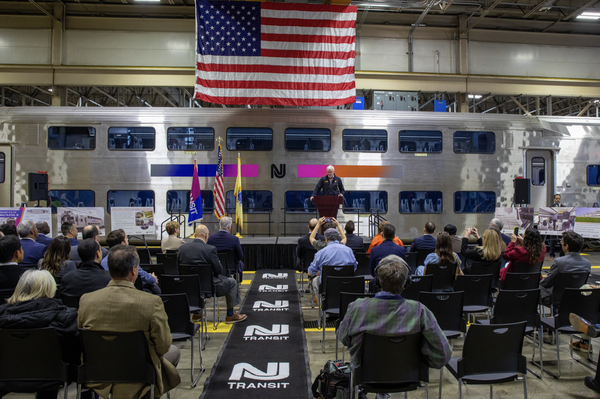NJ Transit has given the public a first look at one of the new multilevel rail cars that will be phased in to the agency's fleet over the coming years. The new trains are billed as a faster, durable and spacious replacement for the single-level rail cars that NJ Transit has used for more than 40 years.
At a news conference in Kearny, Hudson County, on Wednesday, Gov. Phil Murphy (D) joined NJ Transit officials in unveiling the first of four trains that have been delivered to the state. The trains will soon be sent to Colorado for testing and are expected to be brought into service in New Jersey next year.
MORE: SEPTA's website now shows bus detours on maps – and its app eventually will, too
NJ Transit has ordered 174 of the multilevel cars from French manufacturer Alstom Transportation Inc., which is building the trains at its plant in Plattsburgh, New York. The new Multilevel III trains will have upgraded amenities including USB charging ports and onboard displays that show travel information.
NJ Transit initially ordered 113 of the new cars in 2018, but their delivery has been delayed by supply chain issues stemming from the COVID-19 pandemic. The agency made several additional orders in subsequent years to bring the total to 174. New Jersey is investing about $270 million in the new fleet and has received $567.5 million in federal funds for the trains.
In July, NJ Transit increased fares by 15% to mark the agency's first hike in nearly a decade. Fares are scheduled to go up another 3% in July.
Officials said the multilevel trains will offer a dramatic improvement in reliability, which has been a growing problem for NJ Transit during the Murphy administration. Mechanical problems with the current fleet of single-level cars have led to more than 1,800 train cancelations in the summer alone. The system's service fell so far short of performance standards that Murphy made all NJ Transit trains and buses free during the week leading up to Labor Day.
“Providing modern, reliable equipment is a critical component to improving New Jersey’s infrastructure, particularly with regard to public transit,” Murphy said. “These multilevel rail cars are equipped with innovative features that meet the everyday needs of our commuters."
NJ Transit expects the first 113 multilevel cars to be in service by the end of 2026. The entire fleet of 174 is scheduled to be in use by 2029. They'll be the first of their kind in use in the United States.
One of the advantages of the new trains is that they will only need to be inspected every 400,000 miles, compared with every 20,000 miles for the current fleet of Arrow III trains made decades ago by General Electric. The electric-powered trains are self-propelled and can reach a top speed of 110 mph. The Arrow III cars top out between 80-100 mph.
SEPTA also had planned to bring 45 double-decker trains to its Regional Rail fleet, but canceled its contract with Chinese state-owned manufacturer China Railway Rolling Stock Corporation in July. The company had missed numerous deadlines and failed to deliver a single train in seven years. Boston's Massachusetts Bay Transportation Authority also encountered delays and problems with CCRC for an order of rail cars on the city's subway system.
In July, SEPTA announced it had awarded a contract to Hitachi Rail for 200 trains to modernize the Market-Frankford Line subway fleet. The current trains are about 25 years old and are reaching the end of their lifespan. SEPTA anticipates the new subway cars will be in use by 2031.

